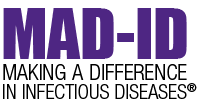
Learning Objectives
The 2026 MAD-ID/SIDP Annual Meeting will feature 9 plenary sessions, 8 application-based workshops, and a keynote address. In addition to this, there will be 2 optional pre-meeting workshops. Individual sessions will each address at least three specific learning objectives. The overall learning experience is designed to achieve the following global learning objectives:
-
Apply evidence-based infectious diseases pharmacotherapy principles to manage complex clinical cases.
-
Strengthen the ability to design, implement, and optimize antimicrobial stewardship initiatives across diverse healthcare environments.
-
Interpret and integrate microbiology, diagnostic, and laboratory data to support clinical decision-making in infectious diseases practice.
-
Evaluate and incorporate emerging research, antimicrobial resistance, PKPD, novel therapeutics, and investigational agents into infectious diseases practice.
-
Critically appraise new evidence, practice innovations, and emerging trends to inform future practice and research.
-
Advance stewardship and clinical practice through effective use of informatics, rapid diagnostics, and technology-enabled decision support.
-
Communicate effectively with clinicians, patients, and interprofessional teams to influence antimicrobial prescribing and promote stewardship.
-
Implement innovative educational approaches to enhance learning and influence behavior change.
-
Integrate principles of implementation science, workflow design, and systems thinking to support sustainable practice changes in ID programs.
-
Develop strategies for creating, funding, and sustaining clinical ID pharmacy services—including billing, workload justification, and value demonstration.